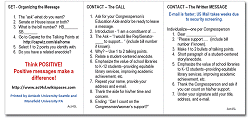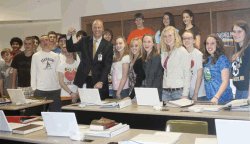 |
| Here’s one side of the “action card” that helps participants communicate with
their government officials. (click for full-size image) |
 |
State Sen. Mike Brubaker (R-Pa.) looked enthusiastic when he visited students of Hempfield High School in Landisville, Pa., on March 25, 2010. (click for full-size image)
|
Historically, when situations become unacceptable, people are able to change them by organizing and uniting. The “invisible librarian” that Gary Hartzell introduced us to in the late 1990s has morphed into the “vanishing school library” today. Although librarians have always had to justify the role of the school library program in education, today it is even more dif ficult. Many states do not require schools to have a librarian or even a library, and with the nation’s economic crisis, only mandated serv ices and programs are being funded. While everyone in your school may recognize the contributions of the school library program, the unfortunate facts are that these programs are expensive to maintain and that whatever is not required is not going to be funded.
In 2007, when the Pennsylvania Department of Education (PDE) eliminated the Division of School Library Services, the Pennsylvania School Librarians Association (PSLA) recognized that the voice for school libraries in our state government was all but extinguished. The PSLA legislation committee (which I co-chair) was charged with re-creating a school library presence in our state capital (Harrisburg) and developing an ac tion advocacy plan. I asked some re tired librarians to join me in meeting with legislators who served on the education committees in the state House and Senate. As a retired school li brarian and part-time university in structor, I was able to make several ap pointments during the weekdays to travel to Harris burg. Initially, we visited with legislators to introduce them to PSLA, to provide background research that connects student learning and library programs, and to tell them about the declining numbers of school libraries in the state.
After several meetings, it became clear that legislators knew very little about school library programs. Some were shocked to learn that schools were not required to have libraries and that programs varied from nonexistent to well-staffed ones where collections were integrated with the school’s curriculum. Legislators wanted answers to the following questions, but we had none:
“How many schools in my district don’t have libraries?”
“How much does it cost to have a good school library?”
“Since the legislature has been steadily increasing money for education [under Governor Rendell’s administration, which ended in January 2010], why hasn’t some of this money been used to fund school libraries?”
The PSLA legislation committee regrouped. Now armed with consultant Stephanie Vance’s book, Government by the People: How to Communicate With Congress, and ideas from her website at www.advocacyguru.com, we learned that we needed to develop a message. We wanted to make legislators aware of the status of our school libraries, and we collected some dismal facts. For example, in 1987, every school in the city of Philadelphia had a certified school librarian and a trained library assistant. Today, there are only 72 certified librarians and 26 assistants in the district’s 258 schools. More than half of the schools no longer have a library. However, wealthier school districts have extensive print and electronic resources, the latest technology, and the benefits of a certified librarian and support staff.
Given our findings, we coalesced around a new approach: “We want equity for kids! All students, regardless of ZIP code, should have access to a quality school library and a certified school librarian who teaches them critical thinking and re search skills required of 21st-century careers.” (“Regardless of ZIP code” became a buzz phrase among our state’s legislators during the 2009–2010 budget crisis, so of course we used it.)
Learning from Stephanie Vance, we also developed what she calls an “ask.” This means, don’t leave a legislator without making it clear what you want him or her to do. We decided to ask legislators to authorize a study to gather data about school library programs so we could learn whether all students had access to the library resources they needed to learn. This became the focal point for our advocacy plan.
Taking Legislators Back to School
Through our initial meetings, we had learned that legislators did not understand the role of today’s school librarian in education. So we determined that they needed to see a school library program in operation, because handouts, research briefs, and office visits weren’t going to be enough. Thus, we conceived the PSLA Legislator @ Your Library campaign in September 2008. Recognizing that working school librarians have little time to organize events, the legislation committee decided to train retired PSLA members to help. After we re searched and planned how legislator visits could be facili tated, I trained five retirees via conference call. The five “event planners,” as we dubbed them, would do most of the background and logistical work but wouldn’t do the actual visit. They act as advisors and handle these other tasks:
- Research which legislators to invite
- Communicate with the legislator’s staff to make and confirm arrangements
- Advise the school librarian on visitation activities, using prepared checklists
- Arrange for media coverage, preparing press releases
- Debrief the school librarian after the visit
The hosting school librarian handles these activities:
- Gets the school’s permission to host a visit and select a date
- Communicates with the event planner
- Hosts the visit, with planned activities
- Shares the PSLA-prepared packet with the legislator
- Arranges for photo opportunities and works with the event planner on media coverage
- Sends thank you notes
We assemble packets in folders that have two pockets. Here’s what we put inside:
- A background sheet about hosting the school library program (which the librarian completes)
- These one-page handouts: Legislator @ Your Library Campaign, Benefits of a Strong School Library Program, Inputs for a Quality School Library Program, and Recommendations for Pennsylvania
- These booklets: School Libraries Work! (free from Scholastic), Measuring Up to Standards Findings (Keith Curry Lance’s study), and Pennsylvania’s School Libraries: Key Players in Education
- Some recent newspaper articles about school libraries
MLS readers could easily customize similar packets for their areas. Printing and mailing these packets are our only expenses, so the program’s cost is quite reasonable if you have volunteers to implement it. You can find all the items in our packet, along with checklists for both the event planner and hosting librarian; lists of potential activities; phone scripts; and sample emails, letters, and press releases on the PSLA website at www.psla.org/index.php/legislation/legislator-your-library-campaign.
We’ve Learned What Works
Since 2009, we have successfully implemented 20 legislator visits and have at least 20 more that are in the works. From our experiences, we have learned some valuable lessons.
Event planners are key. Hosting school librarians have reported that the event planner was key in facilitating the visit. We frequently hear, “I couldn’t have done this without” him or her. Event planners reported that they spent a considerable amount of time scheduling and confirming dates. Without the persistence and follow-through of an event planner, most visits would not have occurred.
Librarians gain exposure and influence. By inviting administrators and school board members or by asking teachers to bring their classes to meet the legislator, the librarian is seen as a leader who goes the extra mile to bring educational opportunities to the school.
Legislators love photo ops with kids. When one harried librarian called me to say that her visit was being canceled, I called the legislator’s secretary to explain that the media was coming to take pictures and write an article for the local newspaper. Guess who came (a bit late, but came nonetheless)? After this, I told the event planners to be sure to inform each legislator’s office staff that press would be coming.
PSLA is recognized with a clear message and focus. By creating the packets and position statements that legislators receive, the Pennsylvania School Librarians Association is gaining recognition as a credible education organization. With more than 800 members, PSLA needs to control and focus the message that all kids deserve the educational opportunities afforded by equitable library programs that have certified school librarians at the helm. Everyone needs to sing the same song, and it needs to be about kids, not librarians.
How We Sustain the Campaign
Creating a legislator visitation program does require leadership, organization, and dedicated volunteers. However, it is not expensive and, after the initial work, is very self-sustaining. A member of the legislation committee posts photos and short blurbs about visits on our website. Checklists help both the event planner and hosting librarian with details. Feedback from both librarians and event planners has all been positive.
I maintain a master chart that helps me see the statewide picture of library visits and office visits that our committee members have made. This is essential with a huge state like Pennsylvania, which has 203 representatives and 50 senators! By knowing which legislators have been visited and the committees they serve on, it is easy to strategically identify districts that need to be visited, especially if we need their support to pass critical legislation. Using the chart in this way, I often ask event planners to call librarians in specific legislative districts to encourage them to host a visit.
When I meet with a legislator in Harrisburg, I often thank the person for visiting one of our libraries. This helps to reinforce the connection to PSLA. The librarians maintain their ties, too. After meeting their representative or senator face to face, librarians do not hesitate to email or call legislators’ offices on other matters that call for their support, demonstrating that relationship-building extends beyond the initial library visit.
I’m happy to report that the House resolution to fund our study was passed by unanimous vote in October 2010. PSLA has since worked with the State Board of Education to develop the survey questions. We anticipate that it will have been launched, via Survey Monkey, by the time you read this.
Legislators need that visual image of kids actively learning in school libraries as they vote on education bills that will ultimately impact our funding. In states that do not mandate school library programs, it is vital that legislators understand the role of the library and librarian in order to ensure that all students have access to quality resources. Our Legislator @ Your Library campaign is truly a win-win for everyone.
|